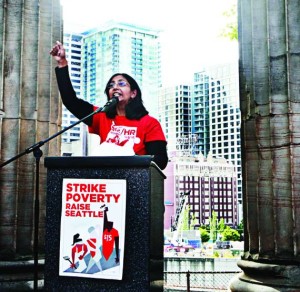Seattle is risking its entire economy on the minimum wage hike

By Andrew Collins and Dustin Hurst | Northwest Watchdog
NOW: Kshama Sawant has a list of demands she really, really wants the city to meet.
The Emerald City is set to collapse.
Not Dorothy’s, but Kshama’s.
Kshama Sawant is the Seattle city councilor pushing her colleagues to force private businesses and nonprofits to raise the minimum wage to $15 per hour — the highest rate in the nation.
While Sawant, an avowed socialist, has been beating the drum on the issue for months, just last week Seattle Mayor Ed Murray announced his intention to support the wage hike.
Yet, as liberals and progressives everywhere are clamoring for social change in the form of government-mandated raises for workers, one supporter of higher pay for minimum wage workers suggests Seattle may be going too far.
“I generally support a higher pay floor. And I love a good experiment. But I can’t help but wonder if Seattle is poised to take a step too far.” wrote Slate business and economics correspondent Jordan Weissmann. He also noted that while the push for a $15 -an-hour minimum wage made for good politics that played well with local progressives, it is “built on dubious economics.”
Weissmann, not mincing words, titled his article, “Goodbye, Seattle.”
The Seattle Times, not exactly a bastion of conservatism, sounded a similar alarm. “This should not be considered merely tinkering, but a re-engineering of the Seattle economy,” the paper’s editorial board wrote. “Seattle is gambling with its economy.
Pushed by Sawant and Washington labor unions, Murray formed an Income Inequality Advisory Committee earlier this year to examine the costs and benefits of potential citywide minimum wage policy. Only three members of the 24-person committee objected to the raise proposal, the mayor said.
Under the proposal, small businesses — those with fewer than 500 employees — would have seven years to bump pay to the $15-an-hour mark. Within five years, these employers must meet $15 per hour in total compensation, including pay, tips and insurance benefits.
Large businesses — those with 500 or more employees — would have three years to reach $15 per hour. No industries or organizations are exempt.
After that, the wage would rise in connection with the consumer price index, which estimates show could double the state-mandated rate of $9.32 an hour to more than $18 by 2025.
Washington State’s minimum wage is already the highest in the nation.
Nick Musser, Seattle Restaurant Alliance president and Icon Grill executive chef, appreciates the mayor for the collaborative process surrounding the issue.
“We were happy we were at the table,” Musser said.
The chef also appreciated the proposal was nuanced to include tips and health coverage in the wage requirement and that restaurants will have time to phase in the increase.
He added that the SRA has some reservations about the mayor’s ambitious plan, though. The group, he said, was disappointed the provision for tips and health care would be phased out over time.
Still, Musser refused to take a direct stance on the issue and pledged the SRA would continue to work with the city council going forward.
Less impressed, surprisingly, is Sawant. Though she’s claimed victory on the issue, she told the Huffington Post she’s not satisfied with the phase-in periods in Murray’s plan and may take the issue to the 2014 ballot if the council fails to address her concerns.
Max Nelson, a labor analyst at the Freedom Foundation in Washington, disputed Murray’s claims the plan will help low-wage Seattle employees.
“Neither low-wage workers, local businesses, or the general economy will benefit from his proposal,” Nelson told Watchdog.org. “If enacted, the wage regulations will make it harder for low-skill, low-wage workers to find and retain employment. Local businesses will be increasingly burdened as the mandates ratchet-up from year to year, forcing them to reduce hiring or benefits, increase prices and potentially close.”
Additionally, award-winning economist Stephen Moore told Watchdog.org last month the wage hike would actually hurt low-income workers and young people looking for opportunities in the labor force.
The Washington Restaurant Association, a key voice of dissent in the debate, released earlier this year a survey of 400 Seattle restaurants and the group’s findings paint a dire picture, close to what Moore predicts. The survey, released last month, found that up to 69 percent of respondents would reduce benefits and/or hours to cope with the higher wage.
A staggering 80 percent of full-service restaurants that responded to the survey said they would likely lay off workers, close a location or go out of business if the city mandates the higher wage.
Contact: Andrew.Collins@FranklinCenterHQ.org or Dustin@Watchdog.org.







